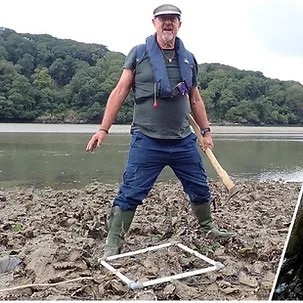
Chris Sharpe leads a project for Falmouth Marine Conservation which surveys and manages the non-native Pacific Oyster population which is taking over the intertidal areas in the Fal. This growth impacts on the biodiversity of the marine intertidal because of the huge growth. The negative effect on Marine infrastructure, and impact on a range of leisure activities especially for children, pets, SUP, ribs and canoes is a growing problem.
The Pacific Oyster Surveys are carried out monthly on low tides to gather data about the rate of unplanned growth of feral non-native species. We work in teams up and down the Fal Estuary to stop the breeding, and monitor growth, patterns, and the impact on biodiversity, recreational enjoyment of the shoreline and the effects of marine infrastructure.
What's involved?
Chris has been running surveys for over 6 years now and on September 9th and 10th will be working in the harbour, with the Harbour Authority and others on the low tides 13.40 and 14.18 for a out two hours. Chris provides all the equipment, a full briefing about the context and purpose of the surveys and Health & Safety. Volunteers will be really welcome, to join the teams each day
Why get involved?
The Pacific oyster (Crassostrea gigas) is an invasive non-native species that was first introduced to Britain in 1926 (GBINNS) and farmed commercially from the 1960s. At the time it was thought that the cool temperatures of UK waters would prevent any spread of this species. However, since its introduction, rising sea temperatures have allowed this species to spread extensively around the coast. In some areas it has become problematic, establishing reefs and excluding other inter tidal species.
Recently there has been increasing concern around the spread of wild Pacific oysters in Marine Protected Areas. According to Natural England, the abundance of Pacific oyster Magallana gigas (formerly Crassostrea gigas) within intertidal Marine Protected Areas has led to some sites being reported as being in unfavourable condition in Devon and Cornwall.
How to get involved?
To apply for a place on the survey contact:
Oystersurveys@falmouthmarineconservation.co.uk
Info@falmouthmarineconservation.co.uk
Ideal Skills
- Conservation
- Research
Ideal Interests
- Community Work
- Conservation
- Outdoor work
